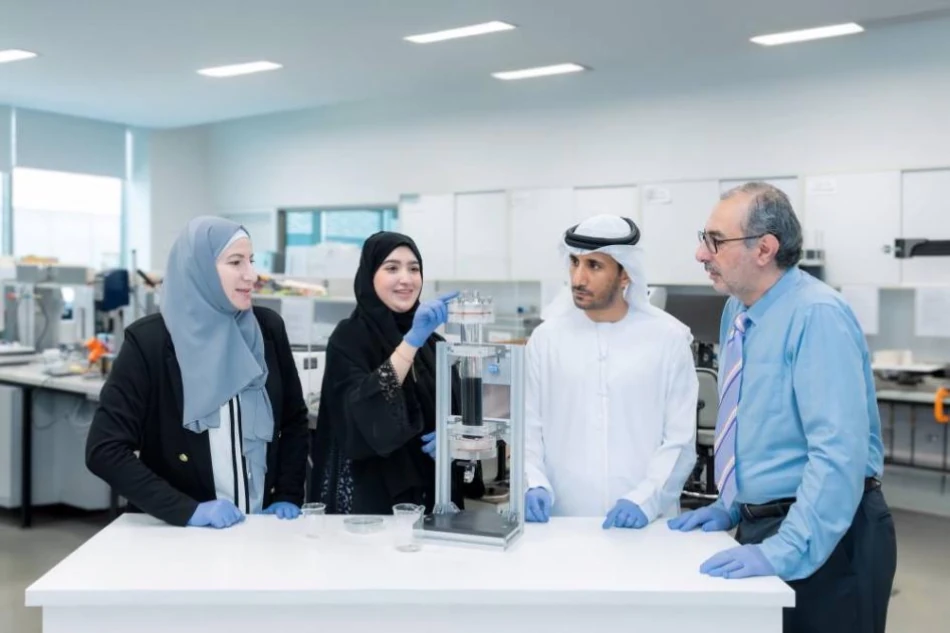
UAE Researchers Awarded Patent for Innovative Water Treatment Technology
UAE Researchers Turn Carbon Waste Into Dual-Purpose Environmental Solution
A multidisciplinary team from the UAE University's College of Engineering has secured a US patent for breakthrough technology that transforms recycled carbon fiber waste into a powerful material capable of simultaneously treating desalination wastewater and capturing carbon dioxide emissions. This innovation positions the UAE as a leader in circular economy solutions while addressing two of the region's most pressing environmental challenges.
The Technology Behind the Breakthrough
The patented method utilizes recycled activated carbon fibers to capture both salt particles and carbon dioxide molecules in a single integrated process. This dual-function approach represents a significant advancement over traditional single-purpose environmental technologies, offering what researchers describe as a comprehensive solution to industrial waste management.
The research team, led by Dr. Amira Mohamed, a lecturer in chemical engineering specializing in sustainable desalination and carbon management, includes Dr. Salem Al Zahmi (associate professor of chemical engineering), Engineer Fatima Bahaa El Din (graduate researcher), and Dr. Walid Ahmed (associate professor of mechanical engineering with expertise in additive manufacturing and advanced materials).
Triple Environmental Impact
The technology delivers three distinct environmental benefits: reducing the environmental impact of saline discharge from desalination plants, capturing industrial carbon dioxide emissions, and recovering economically valuable minerals from waste streams. This multi-pronged approach aligns with global trends toward integrated environmental solutions that maximize resource recovery.
Strategic Significance for the UAE's Sustainability Vision
This breakthrough arrives at a critical time for the UAE, which operates some of the world's largest desalination facilities while simultaneously pursuing aggressive carbon neutrality goals by 2050. The country's heavy reliance on desalination—producing over 4.5 billion cubic meters of desalinated water annually—generates substantial brine waste that poses ongoing environmental challenges.
Market Implications for Water-Scarce Regions
The technology holds particular promise for Gulf states and other water-scarce regions heavily dependent on desalination. Countries like Saudi Arabia, Kuwait, and Qatar, which collectively account for nearly 60% of global desalination capacity, could benefit significantly from integrated solutions that address both water treatment and carbon capture simultaneously.
Global Context and Competitive Positioning
While countries like Singapore and Israel have pioneered advanced water treatment technologies, and nations such as Norway and Canada lead in carbon capture innovation, the UAE's approach of combining both functions using recycled materials represents a unique market position. This integrated methodology could prove especially attractive to emerging economies seeking comprehensive environmental solutions.
Investment and Commercialization Potential
The US patent provides crucial intellectual property protection for potential commercialization, positioning the UAE to export this technology globally. With the global carbon capture market projected to reach $8.9 billion by 2030 and the water treatment market expected to exceed $674 billion by 2030, this dual-purpose innovation could capture significant market share across both sectors.
Technical Innovation in Resource Recovery
The technology's ability to recover valuable minerals from waste streams adds an economic dimension that could make adoption more attractive to industrial operators. This approach transforms environmental compliance from a cost center into a potential revenue generator, a critical factor for widespread industrial adoption.
By converting carbon fiber waste—typically expensive to dispose of—into a valuable environmental remediation tool, the innovation exemplifies circular economy principles that are increasingly driving investment decisions and regulatory frameworks worldwide.
Most Viewed News

 Omar Rahman
Omar Rahman






